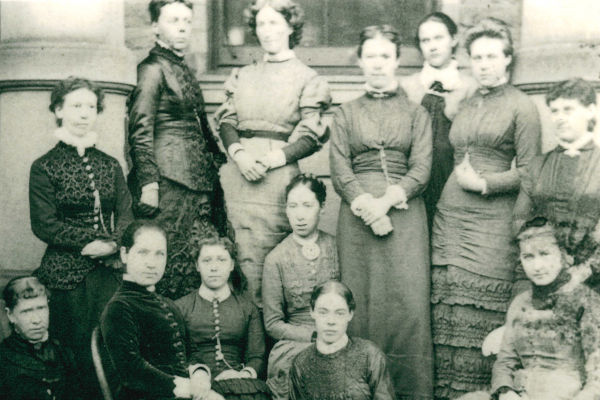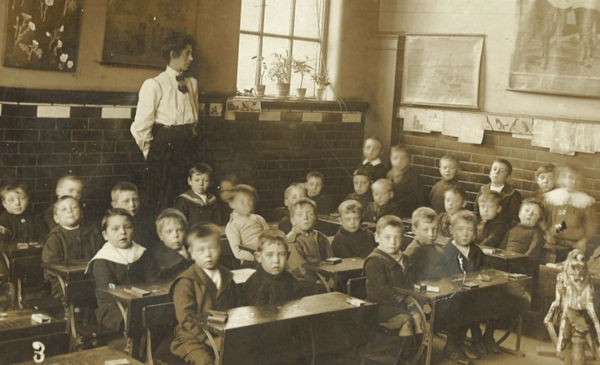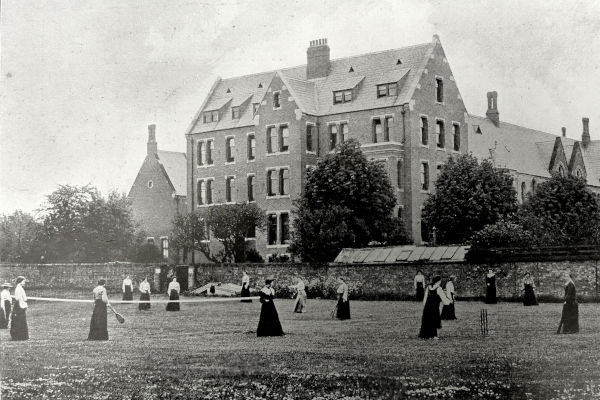Described by the Yorkshire Post and Leeds Intelligencer in 1950 as ‘the stuff of which visionaries and pioneers are made,’ Sarah Anne Walker was a leading figure in the world of teacher training but what was her connection with Saltaire?
Sarah was born in Shipley in March 1870. Her father, Jonathan, was a bookseller and printer. Together with her mother Annie and her younger sister Clara they lived first in Shipley and later at Spring Cottage, Baildon.
Academic achievements

Sarah’s academic gifts emerged at the Salt’s Girls’ High School, where she was both a pupil and later, a teacher. Under the guidance of the progressive headmistresses Medina Griffiths and Harriet Byles, she excelled in Cambridge and Oxford examinations between the years 1885 -1891, earning distinctions in art, history and science.
After passing the Cambridge Teacher’s Syndicate examination, Sarah was able to gain a scholarship to the Maria Gray Training College in 1891. This London college promoted women’s rights to education and the professional recognition of female teachers.
Importantly, it allowed trained teachers to test their skills in a classroom situation something that had a great influence on Sarah in her later career.
Post Graduation

After graduation, Sarah became ‘Mistress of Method’ (a senior lecturer) at Southlands College in Battersea. Southlands opened in 1872 as a training college for women teachers. It had an adjacent Practising School which, like the Maria Gray Training College, provided teaching experience.
While at Southlands Sarah also received the prestigious Gilchrist Travelling Studentship to allow her to study in the United States.
In 1907 she was appointed Vice President at the 16th Annual Meeting of the Association of Training Colleges held in London. Here Sarah advocated the need for improved training for teachers, questioning whether six weeks of training in a two-year course truly qualified someone as a teacher.
The 1911 Census reveals that although Sarah was still employed at Southlands, she remained in touch with a fellow teacher at Salts Girls’ High School, Fanny Hanson, visiting her at 3 Ivy Grove Shipley. Sarah went on to become Vice Principal of Southlands where she championed a higher standard of elementary teaching.
World War One
During World War I, Sarah demonstrated her commitment to national service and women’s roles in society by serving on the Ministry of Labour’s recruiting boards for Women’s Services.
Post World War One

After the war she joined Darlington Training College as a house tutor, eventually becoming Principal in 1922. There she continued to champion Froebelian and Montessori teaching and ran the George Dent Nursery School. This was one of the first open-air nurseries of its kind in the country.
In 1923 Sarah attended the first Nursery School Conference in Manchester. Resolutions were passed in favour of nursery school education for all children under school age and the establishment of a Nursery School Association. Margaret McMillan, the pioneering Bradford educator, was asked to be the first President of the association.
Local and national interest in the George Dent School continued to grow after Sarah gave a speech at the British Federation of University Women in 1927.
In 1931 she was presented to Mary, Princess Royal and Countess of Harewood, on her visit to the school. Four years later, Sarah was speaker at the annual meeting of Sunderland Emergency Open- air nursery, a scheme set up to help many disadvantaged children.
While in Darlington she was active in civic life joining the Darlington Education Committee, the English Association and the League of Nations Union. She also became one of the first two Vice Presidents of the Darlington Townswomen’s Guild- an organisation born out of the women’s suffrage movement.
Retirement
On her retirement in 1936, Sarah donated her retirement gift of £72 to the George Dent Nursery School for an extension and improvements to the building.
By 1939 Sarah had moved to Hampshire. She never married and lived there until she passed away at Headley Down in November 1950 aged 80.
Probate records reveal that Sarah left £15,949 8s and that Julia Pleister was a beneficiary.
Pleister, who had an interest in Whitelands Training College (one of the earliest teacher training colleges and, like Southlands, now part of the University of Roehampton) and her friend Julia Coning (who taught at Darlington whilst Sarah was Principal) began corresponding after Sarah’s death.
Letters between them reveal that a tribute was to be compiled for the Southlands Magazine and an annual lecture was to be given in Sarah’s memory.
Legacy
Darlington College also commemorated Sarah’s work by establishing grants for exploration and travel. These later became the ‘Sarah Walker and Spafford Memorial Fund.’ In 1957 the ‘Shields Daily News’ reported that Miss Anne Fenn was awarded one such scholarship to visit Sweden.
Sarah’s legacy continued until last year when the Charity Commission approved the transfer of funds £134,685 to a more general fund providing larger and more impactful grants to students of Durham University.
It appears that once again the education given by Salt’s Girls’ High School paved the way for a legacy that still echoes today.
References
https://www.britishnewspaperarchive.co.uk/
https://archivesearch.lib.cam.ac.uk/repositories/20/archival_objects/327388
Tracey Williams, 2025